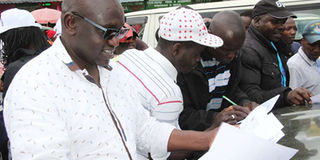We must now move to specifics in our debate about law change

Third Way Alliance leader Ekuru Aukot (left) collects signatures from Kenyans, which he will use to trigger a referendum. PHOTO | FILE | NATION MEDIA GROUP
What you need to know:
- Cutting down the number of political leaders in the country is the one single issue that enjoys overwhelming public support.
- A better model to explore is of Tanzania or Uganda, where an executive president appoints a PM who coordinates ministries and is the Leader of Government Business in Parliament.
Deputy President William Ruto’s recent Chatham House speech was entirely reasonable.
His question on whether it is feasible ahead of 2022 to carry out a national census, then a constituency boundaries review, then the General Election, then a referendum in between, was valid.
The calendar looks quite crowded. The cost aspect is also something that cannot be ignored.
At this point in time, Ruto must be resigned to the inevitability of a referendum somewhere down the line, given that most of the important political players and their constituencies have expressed their support.
If it must happen, he had his own proposals at Chatham. The key plank was that the runner-up in a presidential election and his running mate should become the Official Opposition Leader and Deputy Opposition Leader respectively, with automatic seats in Parliament.
REFERENDUM
The deputy president would become the Leader of Government Business in Parliament, as was the case with the pre-2010 constitution.
Ruto played down the creation of a prime minister’s position, which most of his rivals have supported.
Before the clarity with which he spoke in London, Ruto had blown hot and cold on the referendum issue - one day vehemently opposing it, another day giving his conditional support.
Some time last year, he said — after months of prevarication — that he would support the referendum if it was not about creating positions for “idle” politicians.
This was code for the now popular template about creating the position of PM and two deputy PMs.
Where Ruto is clearly out of sync with the rest of the country is when he flatly opposes, as he did last year, any referendum that reduces the number of counties, constituencies and wards.
REPRESENTATIVES
Cutting down the number of 416 MPs (and senators) and the nearly 2,000 MCAs in the country is the one single issue that enjoys overwhelming public support.
Without reducing the constituencies and wards (and abolishing nominated seats), there is no way we will tackle the burden. Kenyans rightly feel they are politically over-represented.
Raila Odinga is himself not helping matters by the way he is charging on full blast ahead of everybody on this referendum issue.
He alone has confidently suggested it will take place this year, without telling us who he has consulted.
But it is his take it or leave it approach toward perceived referendum opponents that could irritate some people.
His stated preference for a parliamentary system as opposed to the current presidential one is unlikely to win across-the-board consensus.
PRIME MINISTER
The problem is because Raila pegs it to the 2005 Bomas Draft, which came with the unworkable proposal of a ceremonial president elected through universal suffrage, and an executive prime minister who is elected by a college of MPs.
Surely, who would subject himself to a popular vote and be consigned to an office that is powerless?
A better model to explore is of Tanzania or Uganda, where an executive president appoints a PM who coordinates ministries and is the Leader of Government Business in Parliament.
In fact, the question is not whether we will hold a referendum or not. The bigger question is the issues which will be put on the referendum ballot paper.
We must get some measure of agreement on what needs to be amended before we are asked to vote.
WAGE BILL
Lawyer-politician Ekuru Aukot of the Third Way Alliance is already leading the way with his “Punguza Mzigo” referendum campaign.
It proposes to drastically reduce the number of MPs and senators from 416 to 147.
Aukot reckons this will slash the cost of running Parliament from Sh36.8 billion to Sh5 billion, which will save taxpayers a whopping Sh31.8 billion. He also wants presidents to serve a single seven-year term.
Aukot has taken the “popular initiative” route of amending the Constitution, where he must present at least a million signatures to the IEBC so as to trigger a referendum.
If the commission approves the signatures he will be good to go. The county assemblies must then ratify the process, before it comes to Parliament.
Since Aukot’s initiative seeks to change certain structures of government, he must end up the referendum way.
* * * * *
Pope Francis last week summoned a summit of bishops from across the world to discuss child sex abuse.
This is a grave matter for the Catholic Church, which has emerged as having been for decades a nest of paedophiles posing as priests.
The Pope should not be content with homilies and condemnations. He must demand transparency and zero tolerance, plus defrocking and allowing prosecution of those found guilty of the vice.
He has been slow to do this in the past, even as child sex abuse scandals exploded in the United States, Latin America, Europe and lately Australia, where the Vatican’s third most powerful figure, Cardinal George Pell, was last December convicted by a jury of “historical” child sexual abuses.
It is time to clean house, Francis, and to do it convincingly.





